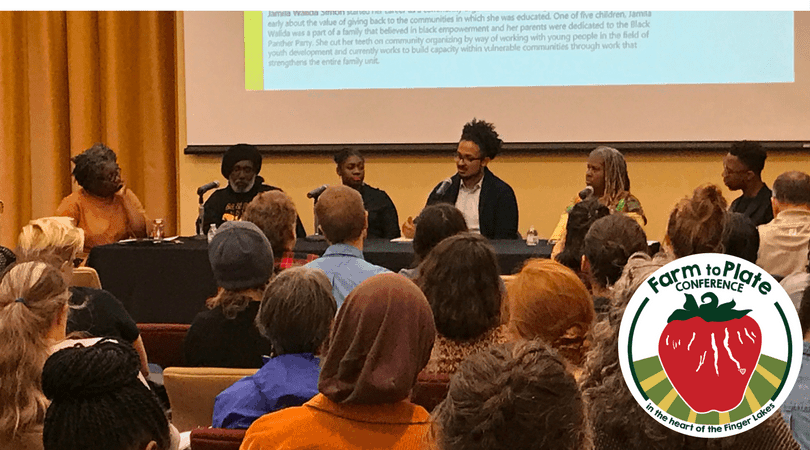
Farm to Plate Conference Re-Cap
Farm to Plate Conference 2017: Uniting for a Just and Sustainable Food System
By Kate Cardona, Groundswell Center for Local Food & Farming
Photo Slide Show Below
As farmer and educator Damon Brangman reflected on the many food and agriculture conferences he has attended around the country, he realized last fall that Ithaca, NY, with its abundant farmland, fresh food, and community members interested in the connection between food and social justice would be an ideal place to host a conference. Through conversations between Brangman, staff members of Groundswell Center for Local Food & Farming and Cornell Professor Rachel Bezner-Kerr, a collaborative vision for the Farm to Plate Conference was born.
This May, that vision came to life as over 300 people gathered in Ithaca for three days to “Educate, Celebrate and Create a Just and Sustainable Food System”. One of the underlying questions throughout the conference was: What makes a food system both sustainable AND just? The many powerful keynote speakers and panel presenters had lots of valuable experience and insight to help answer this question. The conference kicked off Thursday night at Cornell’s Africana Center with a speaker panel of four Black farmers and food activists, Rafael Aponte, Jamila Simon, Karen Washington and Malik Yakini.
Thursday’s panelists each spoke about the work they do for food sovereignty, or “the right of peoples to healthy and culturally appropriate food produced through ecologically sound and sustainable methods, and their right to define their own food and agriculture systems”*. Each panelist works within an organization that support Black community members to grow their own food on their own terms. They grounded the discussion of their efforts in the history of racism in the U.S. food system, including the genocide of the indigenous peoples of this continent, the reality of slavery and exploitation as the economic backbone of this country, the food desert neighborhoods decimated through racist zoning and housing policies, and the ongoing exploitation of immigrant farm and food workers. Yet, as each panelist made clear, as long as these unjust policies have existed, so too has resistance. People of color have long been at the forefront of movement for food justice, land access and healthy, fresh food for all. This work continues around the country today.
Friday began at the Greenstar Space with an exciting panel of farmers and academic agro-ecologists thinking through the meaning and importance of agroecology on both a local and a global scale. Agroecology is “an approach that seeks to integrate ecological science with other disciplines (e.g. agronomy, sociology, history, etc.) and knowledge systems (e.g. local, indigenous, etc.) to guide research and actions towards the sustainable transformation of our current agrifood system.”** Through lessons learned from local farmers Thor Oechsner and Erica Frenay, to insights gained from the international research of professors Hannah Wittman, V. Ernesto Mendez and writer and activist Raj Patel, the importance of taking a holistic, transdisciplinary approach to agriculture – looking not only at its ecological implications but also its social, political, and economic impacts – rose to the forefront.
Patel continued digging into these topics in his keynote talk Friday afternoon entitled “Reparation Ecology”, asking the audience to consider how European colonialism and capitalism combined to create our current food system. While the local food movement provides part of an answer to the imbalances and injustices these systems have created, it does not fully address the underlying issues of patriarchy, racism, or climate change. To truly transform our food system, Patel advocates for first, a recognition of this history, leading to reparation, redistribution, reimagination and finally, recreation.
Conference participants applied many of these themes on Friday afternoon, through facilitated Roundtable Discussions on the topics of food movements, urban gardening, school food, food policy and more. The Roundtables enabled people to connect to existing efforts and resources as well as brainstorm new ideas for strengthening our Finger Lakes food system. The afternoon offered tours of many regional farms including Kingbird Farm, Wellspring Forest Farm, Interbrook Farm, Farmer Ground Flour and Groundswell Center’s Incubator Farm and gave participants insight into some of the innovative practices employed by the sustainable farmers of the Finger Lakes. Friday concluded at BJM Elementary with a fundraiser dinner for Brangman’s project, Roots Rising Farm, plus an award ceremony honoring several key individuals who have contributed to the vibrant Finger Lakes food and farm community. The evening was well-capped with a powerful keynote from Malik Yakini of the Detroit Black Food Security Coalition.
On Saturday, community members, educators, farmers and food justice activists offered workshops and skillshares on topics ranging from Food Policy to Growing Mushrooms to Cooking on a Budget and more than a dozen more. It is more clear than ever that this community has so much knowledge to offer each other toward creating a just and sustainable food system. The Conference closed with an Action Planning session where participants discussed how to ensure that those who are most directly impacted by inequities in the food system are centered in decision making. Exciting ideas emerged related to school food policy, urban gardening, food waste and others. The Farm to Plate Conference created a space for people from different sectors of the food system to learn together and continue to address the most pressing food issues of our time and place, with a holistic, justice-based approach. Stay tuned for next steps!
Video’s of the keynotes will be posted soon. Get notified by joining the Groundswell Center newsletter and liking us on Facebook!
*www.uvm.edu/agroecology/our-approach/agroecology
**http://usfoodsovereigntyalliance.org/what-is-food-sovereignty/
[metaslider id=4927]
photo credit: Noah Levin, Jamie Love
